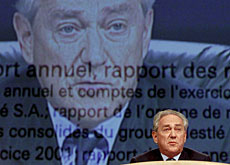Brabeck handed double mandate at Nestlé

Nestlé chief executive Peter Brabeck will take on the additional role of chairman despite stiff opposition from some shareholders.
Brabeck had threatened to resign if he didn’t get his way at the company’s annual general meeting in Lausanne on Thursday.
A proposal to keep the two jobs separate gained the support of 35.9 per cent of shareholders’ votes – well short of the 50 per cent needed for it to pass, but far higher than the 20 per cent its supporters had expected.
“I accept this mandate with a bit of disappointment because of the circumstances in which it has been bestowed on me,” Brabeck said after the vote.
In the face of the unexpectedly fierce opposition to Brabeck’s double mandate, Nestlé signalled that it had plans for an eventual successor.
“We can’t give you the exact amount of time for which Mr Brabeck will fill the double mandate, but the general feeling at Nestlé is that this double mandate could last around two to three years,” outgoing chairman Rainer Gut said.
Challenge
Ahead of the shareholders’ meeting, some investors had challenged the idea of making Brabeck chief executive and chairman of the world’s biggest food group.
Switzerland’s Ethos Investment Foundation, which represents 83 pension funds from across the country, launched three counter-proposals to prevent the company putting too much power in the hands of one man.
Dominique Biedermann, head of the Geneva-based foundation, said the move flew in the face of the principles of corporate governance.
“In the interest of strategic continuity there should be a separation of offices,” Biedermann told the meeting.
He acknowledged before the vote that opponents were unlikely to win a majority, but they wanted to “send a clear signal” to management.
Ethos was supported by a number of international investors, including American giant Institutional Shareholders Services.
Nestlé, which has its headquarters in Vevey on Lake Geneva, countered that splitting the two roles would sacrifice continuity and stability following the resignation of Gut.
Gut, who is 72, was obliged to step down from the company board because of his age.
Threat
The food multinational said on Sunday that Brabeck and the entire board would resign if opponents managed to derail the double mandate. But the firm backtracked the following day, saying this was not the case.
Opponents also criticised Nestlé for failing to find another successor to Gut, despite having five years in which to do so. Gut announced back in 2000 that he would retire as chairman.
However, the company maintained that no other suitable candidate was available and Brabeck was the best man for the job.
“With Brabeck we have the certainty of entrusting chairmanship and management to a man who can be trusted and who is profoundly steeped in the corporate culture and in the principles of Nestlé,” Gut said in his speech to shareholders on Thursday.
Brabeck, who has spent his entire working life with Nestlé, was appointed chief executive in 1997.
He has been credited with pushing the maker of Kit Kat chocolate bars and Nescafé into more profitable areas such as health food products.
The company’s shares have almost doubled in value during Brabeck’s eight years at the helm.
swissinfo with agencies
2,539 shareholders attended the Nestlé annual meeting.
A proposal to split the roles of chairman and CEO was backed by 35.94% of votes.
To succeed, the proposal would have needed 50% of votes cast.
The proposal was presented by the Ethos foundation, which had the backing of five large Swiss pension funds.

In compliance with the JTI standards
More: SWI swissinfo.ch certified by the Journalism Trust Initiative










You can find an overview of ongoing debates with our journalists here . Please join us!
If you want to start a conversation about a topic raised in this article or want to report factual errors, email us at english@swissinfo.ch.